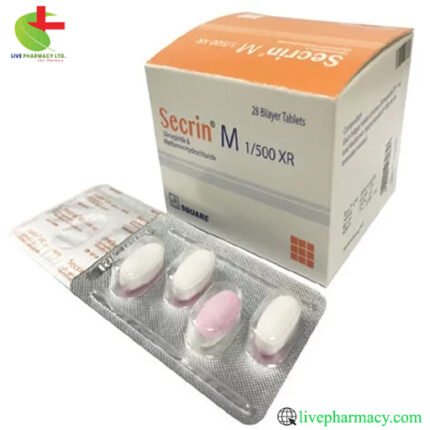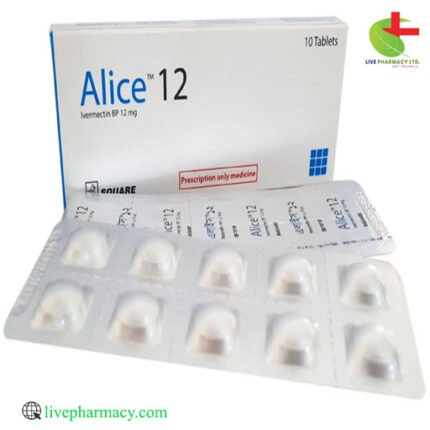Secrin M 2/500 XR
48.00৳ Strip
- Experience a potent combination tablet for managing type 2 diabetes mellitus effectively.
- Our tablet contains Glimepiride and Metformin Hydrochloride, serving as an adjunct to diet and exercise.
- Glimepiride stimulates insulin release, while Metformin enhances insulin sensitivity and glucose uptake.
- Comprehensive glycemic control is achieved through regular monitoring and careful dosage adjustments.
- Empower yourself to take charge of your diabetes management journey with confidence.
 Brand
Brand
|
Square Pharmaceuticals PLC |
|---|---|
 Generics
Generics
|
Glimepiride + Metformin |
Indications
This tablet serves as a complementary treatment alongside diet and exercise for patients with type 2 diabetes mellitus. It is particularly useful when monotherapy with glimepiride or metformin fails to achieve adequate glycemic control or when replacing a combination therapy of glimepiride and metformin.
Pharmacology
Glimepiride, a sulfonylurea antidiabetic agent, reduces blood glucose concentration primarily by stimulating insulin release from pancreatic beta cells. It also enhances beta cell sensitivity to glucose, leading to increased insulin secretion. Additionally, Glimepiride may reduce basal hepatic glucose production and improve peripheral tissue sensitivity to insulin. Metformin Hydrochloride, a biguanide type oral antihyperglycemic drug, lowers both basal and postprandial plasma glucose levels by decreasing hepatic glucose production and intestinal absorption of glucose while enhancing peripheral glucose uptake and utilization.
Dosage
The dosage of this tablet should be adjusted to achieve the desired blood glucose level, with regular monitoring of blood and urine glucose levels during treatment. It’s crucial to avoid correcting missed doses by taking larger ones. Adjustments in dosage may be necessary over time to prevent hypoglycemia.
Administration
This tablet should be swallowed whole and not crushed or chewed.
Interactions
Glimepiride metabolism is influenced by cytochrome P450 2C9 (CYP2C9), which should be considered when coadministering with drugs that affect CYP2C9 activity. Certain drugs may potentiate or weaken the blood-glucose-lowering effect of glimepiride, necessitating careful monitoring and potential dosage adjustments.
Metformin interactions include precautions with alcohol and iodinated contrast agents, as well as caution with drugs affecting renal function and organic cation transporters (OCT).
Contraindications
Glimepiride should not be used in patients hypersensitive to sulfonylureas, sulphonamides, or any excipients, pregnant or breastfeeding women. Metformin is contraindicated in individuals with hypersensitivity to metformin, acute metabolic acidosis, severe renal or hepatic impairment, acute conditions affecting renal function, and lactation.
Side Effects
Common side effects of glimepiride include hypoglycemia, gastrointestinal symptoms, and visual impairment. Metformin may cause gastrointestinal symptoms, metallic taste, and decrease in vitamin B12 absorption.
Pregnancy & Lactation
Glimepiride and metformin usage during pregnancy and lactation require careful consideration due to potential risks to the fetus or nursing infant. Insulin is recommended for pregnant women with diabetes, while metformin use should be avoided during pregnancy.
Precautions & Warnings
Close monitoring for hypoglycemia is necessary during the initial weeks of glimepiride treatment, especially in patients with risk factors. Metformin therapy requires regular monitoring of thyroid-stimulating hormone (TSH) levels and vitamin B12 levels.
Use in Special Populations
Limited data are available regarding the use of this tablet in pediatric populations. Renal function should be assessed before initiating metformin therapy and regularly thereafter, with dosage adjustments based on renal function.
Overdose Effects
Overdose of glimepiride may lead to severe hypoglycemia, necessitating immediate medical attention. Metformin overdose may result in lactic acidosis, which requires prompt treatment in a hospital setting.
Therapeutic Class
This tablet belongs to the therapeutic class of combination oral hypoglycemic preparations.
Storage Conditions
Store this tablet in a cool, dry place away from light, with temperatures not exceeding 25°C.













Reviews
There are no reviews yet.